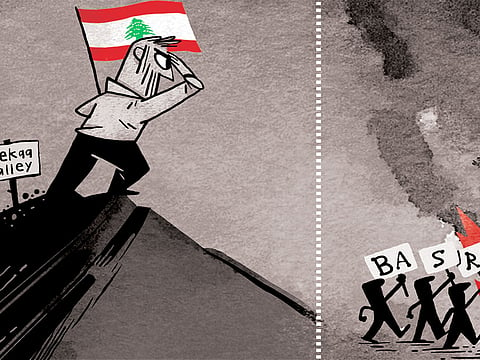Basra unrest echoes in Bekka Valley
Lebanese MP’s comments have created a deep fissure within the March 8 Alliance, where Nabih Berri is a pivotal figure

The demonstrations of Basra, now entering their third week, are inspiring thousands of underprivileged young people throughout the Arab world. But nowhere are they felt as strongly as the Bekaa Valley in Lebanon, which like Basra, is inhabited by disgruntled Shiite Muslims, fed up with years of neglect, corruption, lack of basic services, unemployment, and lawlessness.
Technically, however, the Bekaa is very different from Basra. It hasn’t been distorted by long wars, two uprisings, Iranian shelling, US occupation, and gripping sanctions. In other words, the region is still salvageable — but perhaps, not for too long. In Basra, the protesters recently blocked access to Iraq’s oilfields, leading to the evacuation of foreign staff of Exxon-Mobil and other companies, threatening to reduce the city’s oil output. That prompted Prime Minister Haidar Al Abadi to rush to the city on July 13, hearing out people’s grievances, and Saudi Arabia to offer to pay for its electricity, after Iranian assistance stopped coming ahead of this exceptionally hot weather.
No such measures were taken in Lebanon, prompting the Bekaa Valley MP Jamil Al Sayyed, a former security chief, to tweet that the Bekaa was a “time bomb” waiting to explode. He said that senior Shiites in government should not remain blinded to its dire conditions.
One month ago, towns in the Bekaa were flooded by heavy rain, causing an electricity blackout due to poor installations and no proper sewage, which led to the death of one woman. Residents have been complaining of high unemployment and rising lawlessness, partially caused by the influx of thousands of Syrian refugees. Arms are abundant in the Bekaa, along with the cultivation and sale of hashish. In what was believed to be a message directed against Parliament Speaker Nabih Berri, a veteran Shiite leader, Al Sayyed added: “You have given a lot to the south [of Lebanon]. It is now time to pay attention to the Bekaa, before you lose it!”
The comments have created a deep fissure within the Hezbollah-led March 8 Alliance, where Nabih Berri is a pivotal figure. Last May, Hezbollah and Berri’s Amal Movement helped bring Al Sayyed to parliament, in compensation for the four years that he spent in jail in 2005-2009, accused of complicity in the murder of Lebanon’s ex-prime minister Rafik Hariri.
Berri supporters are now accusing him of being ungrateful and of sowing discord within the Shiite camp, especially after he drew distinction — also via Twitter — between “Shiites of the state [Berri] and Shiites of the resistance [Hassan Nasrallah].” That comment struck a particularly raw nerve, as Shiite politicians have always insisted that the Shiite camp is one, and all its senior leaders are members of the “resistance.” Berri supporters are demanding an apology, claiming that Al Sayyed has his eyes set on the speakership of parliament, which has been in Berri’s hands since 1992 and to which he was re-elected for a four-year term just two months ago.
Al Sayyed, who previously served as head of Lebanese General Security, realises that such an ambition is too far-fetched, at least for now, since none of the main players in Lebanon would agree to his nomination, especially not members of the Sa’ad Hariri-led 14 March Coalition. He also cannot become minister, because by norm, only leaders of parliamentary blocs are entitled to government posts. Instead, Al Sayyed is aiming at a bigger role in Shiite politics, trying to position himself as a spokesman for the Bekaa, or a counterweight to Berri, who still reigns in Southern Lebanon but suffered electoral setbacks in the Bekaa last May. Al Sayyed hopes to attract listeners and fans ahead of a Amal Movement congress scheduled for next May, creating a “new voice” within the Shiite community.
Nasrallah silent
This is a rare case of disagreement within the Shiite community of Lebanon, which has been firmly aligned behind Berri and Nasrallah since the early 1990s. Al Sayyed is exceptionally close to Nasrallah, and both to the Syrians and Iran. While lashing out at Berri, he is being very careful not to cross Nasrallah, who until now, has remained silent in the feud between both men. For Jamil Al Sayyed, he sees a window of opportunity in the Basra demonstrations, hoping that they can inspire Lebanese Shiites to rise against their traditional leadership in the Bekaa Valley and beyond. On more than one level, he sees inspiration in Iraq, where although technically part of the same Shiite bloc, different voices are emerging over Basra, challenging Prime Minister Abadi, from Ammar Al Hakim to Moqtada Al Sadr, who are all former proteges of Iran. He lacks the funds needed for his project, however, has no power base, and no institutional network or party apparatus to lean on, which will make his task rather difficult.
The latest crisis within March 8 comes after a similar outburst occurred last year, between Berri and President Michel Aoun’s son-in-law and Foreign Minister Jibran Bassil. Back then, they quarrelled over the distribution of power, especially after Aoun signed off a decree without consulting with his finance minister, who is a member of Berri’s Amal Movement. A violent outburst broke out within March 8, with Berri supporters accusing Aoun of violating the constitution, marginalising Shiites, and empowering the Christian presidency at the expense of other components of Lebanese society. Two conflicts in one camp — within a time period of just six-months — is not healthy, and its starting to show on March 8, which until recently, had been exceptionally united.
Sami Moubayed is a Syrian historian and former Carnegie scholar. He is also author of Under the Black Flag: At the frontier of the New Jihad.


